中考英语 不定式省略to的10种情况
归纳省略to的动词不定式用法

归纳省略to的动词不定式用法归纳省略"to"的动词不定式用法动词不定式是英语中的一个重要语法结构,它由动词原形加上不定式标志"to"构成。
然而,在某些情况下,我们可以省略动词不定式中的"to"。
本文将总结归纳省略"to"的动词不定式用法。
1. 动词感官(verbs of perception)有些动词表示感官知觉,当它们后面接动词不定式时,可以省略"to"。
这些动词包括:- see(看见)- hear(听见)- watch(观看)- feel(感觉)- notice(注意到)- observe(观察)- perceive(察觉)- etc.示例:- I saw him leave the room.(我看见他离开了房间。
)- She heard the birds sing.(她听见了鸟儿的歌声。
)2. 动词让步(verbs of permission)某些动词表示允许、让步,当它们后面接动词不定式时,可以省略"to"。
这些动词包括:- let(允许)- make(使)- have(让)- help(帮助)- watch(观看)- etc.示例:- They let me go to the party.(他们让我去参加派对。
)- She made him clean his room.(她让他打扫了房间。
)3. 动词感觉(verbs of sensation)有些动词表示感觉,当它们后面接动词不定式时,可以省略"to"。
这些动词包括:- feel(感觉)- hear(听到)- listen(听)- watch(看)- smell(闻)- etc.示例:- I heard her sing beautifully.(我听到她唱得很美。
)- He watched the sunset in awe.(他惊叹地看着日落。
不定式省略to的九种情况
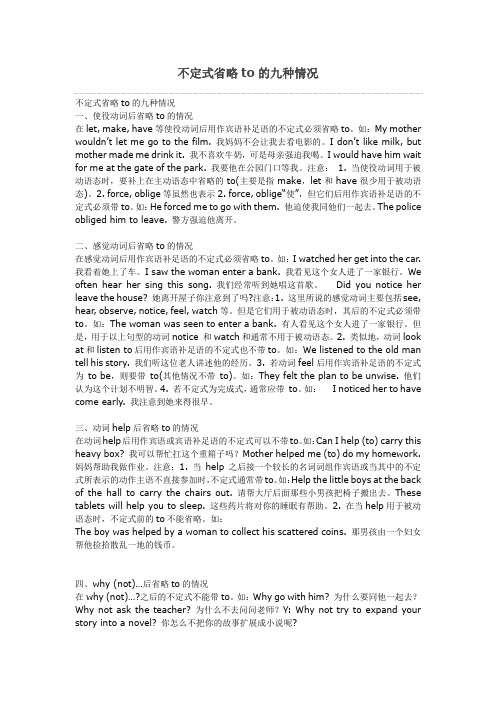
不定式省略 to 的九种情况不定式省略 to 的九种情况 一、使役动词后省略 to 的情况 在 let, make, have 等使役动词后用作宾语补足语的不定式必须省略 to。
如:My mother wouldn’t let me go to the film. 我妈妈不会让我去看电影的。
I don’t like milk, but mother made me drink it. 我不喜欢牛奶,可是母亲强迫我喝。
I would have him wait for me at the gate of the park. 我要他在公园门口等我。
注意: 1. 当使役动词用于被 动语态时,要补上在主动语态中省略的 to(主要是指 make,let 和 have 很少用于被动语 态)。
2. force, oblige 等虽然也表示 2. force, oblige“使”,但它们后用作宾语补足语的不 定式必须带 to。
He forced me to go with them. 他迫使我同他们一起去。
如: The police obliged him to leave. 警方强迫他离开。
二、感觉动词后省略 to 的情况 在感觉动词后用作宾语补足语的不定式必须省略 to。
如:I watched her get into the car. 我看着她上了车。
I saw the woman enter a bank. 我看见这个女人进了一家银行。
We often hear her sing this song. 我们经常听到她唱这首歌。
Did you notice her leave the house? 她离开屋子你注意到了吗?注意: 这里所说的感觉动词主要包括 see, 1. hear, observe, notice, feel, watch 等。
但是它们用于被动语态时,其后的不定式必须带 to。
如:The woman was seen to enter a bank. 有人看见这个女人进了一家银行。
不定式省略to的九种情况
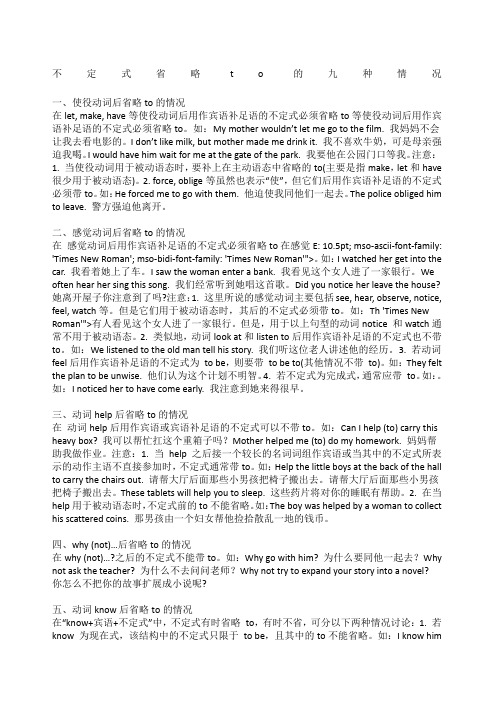
不定式省略t o的九种情况一、使役动词后省略to的情况在let, make, have等使役动词后用作宾语补足语的不定式必须省略to等使役动词后用作宾语补足语的不定式必须省略to。
如:My mother wouldn’t let me go to the film. 我妈妈不会让我去看电影的。
I don’t like milk, but mother made me drink it. 我不喜欢牛奶,可是母亲强迫我喝。
I would have him wait for me at the gate of the park. 我要他在公园门口等我。
注意:1. 当使役动词用于被动语态时,要补上在主动语态中省略的to(主要是指make,let和have 很少用于被动语态)。
2. force, oblige等虽然也表示“使”,但它们后用作宾语补足语的不定式必须带to。
如:He forced me to go with them. 他迫使我同他们一起去。
The police obliged him to leave. 警方强迫他离开。
二、感觉动词后省略to的情况在感觉动词后用作宾语补足语的不定式必须省略to在感觉E: 10.5pt; mso-ascii-font-family: 'Times New Roman'; mso-bidi-font-family: 'Times New Roman'">。
如:I watched her get into the car. 我看着她上了车。
I saw the woman enter a bank. 我看见这个女人进了一家银行。
We often hear her sing this song. 我们经常听到她唱这首歌。
Did you notice her leave the house? 她离开屋子你注意到了吗?注意:1. 这里所说的感觉动词主要包括see, hear, observe, notice, feel, watch等。
不定式to的省略

不定式to的省略一、并列不定式省略to当两个或多个作用相同的不定式并列时,通常只需在第一个不定式前用to,其余不定式前的to可以省略。
如:He told me to stay there and wait for him.他叫我在那儿等他。
It is easier to persuade people than (to) force them. 说服人容易,强迫人难。
★注意:但是,如果两个不定式表示对照或对比,或为了强调,则要重复to, 如:They come not to save us, but to conquer us.他们不是为了拯救我们而来,而是为了征服我们而来。
二、在why和why not引导的疑问句中,不定式一般省略to;“Why…?”通常用来表示不满或委婉的批评,而“Why not…?”则表示建议,如:Why worry about such trifles? 为何为琐事烦心?Why not do it right now?为什么不现在就做?三、在感观动词后用作宾语补足语的不定式必须省略to,常见的感观动词有hear, feel, see, watch, notice, observe等,如:I watched her get into the car. 我看着她上了车。
Did you notice her leave the house?她离开屋子你注意到了吗?★注意:在被动语态中,要把to还原,即不能省略to,如:They were made to work the whole night by the boss.四、在使役动词后用作宾语补足语的不定式必须省略to,常见的使役动词有have, let, make 等,如:The boss made them work the whole night. 老板让他们一整夜都在干活。
My mother wouldn’t let me go to the film. 我妈妈不会让我去看电影的。
需要省略to的不定式的情况有
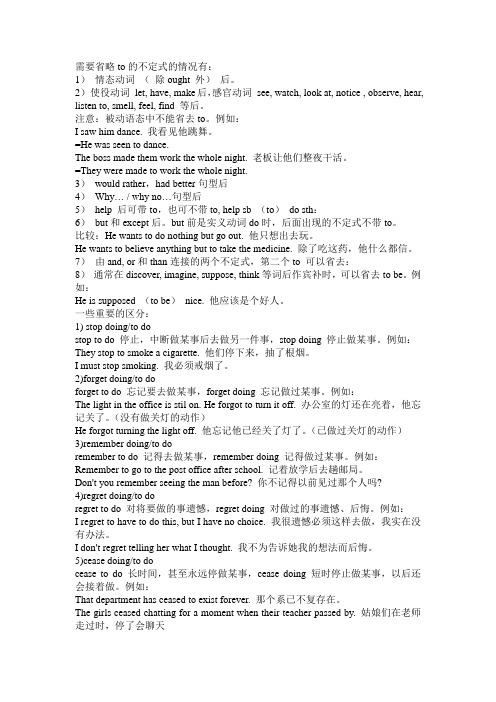
需要省略to的不定式的情况有:1)情态动词(除ought 外)后。
2)使役动词let, have, make后,感官动词see, watch, look at, notice , observe, hear, listen to, smell, feel, find 等后。
注意:被动语态中不能省去to。
例如:I saw him dance. 我看见他跳舞。
=He was seen to dance.The boss made them work the whole night. 老板让他们整夜干活。
=They were made to work the whole night.3)would rather,had better句型后4)Why… / why no…句型后5)help 后可带to,也可不带to, help sb (to)do sth:6)but和except后。
but前是实义动词do时,后面出现的不定式不带to。
比较:He wants to do nothing but go out. 他只想出去玩。
He wants to believe anything but to take the medicine. 除了吃这药,他什么都信。
7)由and, or和than连接的两个不定式,第二个to 可以省去:8)通常在discover, imagine, suppose, think等词后作宾补时,可以省去to be。
例如:He is supposed (to be)nice. 他应该是个好人。
一些重要的区分:1) stop doing/to dostop to do 停止,中断做某事后去做另一件事,stop doing 停止做某事。
例如:They stop to smoke a cigarette. 他们停下来,抽了根烟。
I must stop smoking. 我必须戒烟了。
2)forget doing/to doforget to do 忘记要去做某事,forget doing 忘记做过某事。
不定式省略to的九种情况
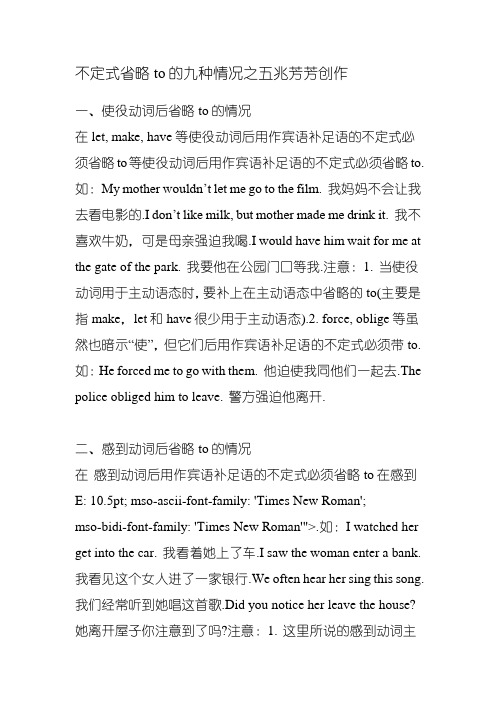
不定式省略to的九种情况之五兆芳芳创作一、使役动词后省略to的情况在let, make, have等使役动词后用作宾语补足语的不定式必须省略to等使役动词后用作宾语补足语的不定式必须省略to.如:My mother wouldn’t let me go to the film. 我妈妈不会让我去看电影的.I don’t like milk, but mother made me drink it. 我不喜欢牛奶,可是母亲强迫我喝.I would have him wait for me at the gate of the park. 我要他在公园门口等我.注意:1. 当使役动词用于主动语态时,要补上在主动语态中省略的to(主要是指make,let和have很少用于主动语态).2. force, oblige等虽然也暗示“使”,但它们后用作宾语补足语的不定式必须带to.如:He forced me to go with them. 他迫使我同他们一起去.The police obliged him to leave. 警方强迫他离开.二、感到动词后省略to的情况在感到动词后用作宾语补足语的不定式必须省略to在感到E: 10.5pt; mso-ascii-font-family: 'Times New Roman';mso-bidi-font-family: 'Times New Roman'">.如:I watched her get into the car. 我看着她上了车.I saw the woman enter a bank. 我看见这个女人进了一家银行.We often hear her sing this song. 我们经常听到她唱这首歌.Did you notice her leave the house? 她离开屋子你注意到了吗?注意:1. 这里所说的感到动词主要包含see, hear, observe, notice, feel, watch等.但是它们用于主动语态时,其后的不定式必须带to.如:Th 'Times New Roman'">有人看见这个女人进了一家银行.但是,用于以上句型的动词notice 和watch通常不必于主动语态.2. 类似地,动词look at和listen to后用作宾语补足语的不定式也不带to.如:We listened to the old man tell his story. 我们听这位老人讲述他的经历.3. 若动词feel后用作宾语补足语的不定式为to be,则要带to be to(其他情况不带to).如:They felt the plan to be unwise. 他们认为这个筹划不明智.4. 若不定式为完成式,通常应带to.如:.如:I noticed her to have come early. 我注意到她来得很早.三、动词help后省略to的情况在动词help后用作宾语或宾语补足语的不定式可以不带to.如:Can I help (to) carry this heavy box? 我可以辅佐扛这个重箱子吗?Mother helped me (to) do my homework. 妈妈帮忙我做作业.注意:1. 当help 之后接一个较长的名词词组作宾语或当其中的不定式所暗示的动作主语不直接介入时,不定式通常带to.如:Help the little boys at the back of the hall to carry the chairs out. 请帮大厅前面那些小男孩把椅子搬出去.请帮大厅前面那些小男孩把椅子搬出去.These tablets will help you to sleep. 这些药片将对你的睡眠有帮忙.2. 在当help用于主动语态时,不定式前的to不克不及省略.如:The boy was helped by a woman to collect his scattered coins. 那男孩由一个妇女帮他捡拾散乱一地的钱币.四、why (not)…后省略to的情况在why (not)…?之后的不定式不克不及带to.如:Why go with him? 为什么要同他一起去?Why not ask the teacher? 为什么不去问问老师?Why not try to expand your story into a novel? 你怎么不把你的故事扩展成小说呢?五、动词know后省略to的情况在“know+宾语+不定式”中,不定式有时省略to,有时不省,可分以下两种情况讨论:1. 若know 为现在式,该结构中的不定式只限于to be,且其中的to不克不及省略.如:I know him to be ill. 我知道他病了.We knew her to be honest. 我们知道她是诚实的.2. 若know为完成式或过来式,则该结构中的不定式可以用除to be外的其他动词,且此时其中的to可以省留.如:I never knew him (to) do such a thing. 我从未听说他会干那种事.We’ve never known him (to) tell a lie. 我们从未听说他撒过谎.I’ve never known it (to) snow in July before. 我从未听说过有七月下雪的事.但在主动语态中不定式前的to不克不及省略.这样用的know不但仅暗示一般意义的“知道”,而是暗示一种经历,因此常译为“曾“……过”(用于肯定句时)或“(从来)没有……过”(用于否认句时)..六、介词except / but后省略to的情况用作介词except, but宾语的不定式有时带tw Roman'">except, but,有时不带to.其大致原则是:若其前出现了动词do,其后的不定式通常不带to;若其前没有出现动词do,则其后的不定式通常带to.如:I had no choice but to wait. 除了等,我没有此外选择.He wanted nothing but to stay there. 他只想留在那儿.It had no effect except to make him angry. 除惹他生气外,没产生任何效果.She can do everything except cook. 除了做饭之外她什么都会.七、主语带do表语省略to的情况当主语部分有动词do的某种形式时,用作表语的不定式可以省略to.如:All you do now is (to) complete the form. 你现在要做的只是把这张表填好.The only thing to do now is (to) go on. 前进是现在唯一的出路.What I’ll do is (to) tell her the truth. 我要做的就是告知她真相.八、并列不定式省略to的情况当两个或多个作用相同的不定式并列时,通常只需在第一个不定式前用to,其余不定式前的to可以省略.如:He told me tostay there and wait for him. 他叫我在那儿等他.I’m really puzzled what to think or say. 我真不知该怎么想怎么说.我真不知该怎么想怎么说.It is easier to persuade people than (to) force them. 说服人容易,强迫人难.但是,如果两者有对比关系,则前面不定式前的to不成省略.如:To try and fail is better than not to try at all. 测验考试而失败总比不测验考试好.九、省略不定式是否保存to在一定的上下文中,为了避免重复,有时不定式可以省略,但通常保存不定式符号to.如:I shall go if I want to. 如果我想去就去.“Don’t be late.” “I’ll try not to.” “不要来晚了.”“我尽量不来晚.”Don’t go till I tell you to. 等我叫你走你再走.注意:1.若被省略的不定式为to be短语,则通常应保存to be.如:He is not the man he used to be. 他已不是原来的那个样子了.2. 有时省略不定式时,同时也可省略to.如:">toShe may go if she likes (to). 她想去就可以去.动词不定式省略to的情况:(1)不定式在感不雅动词(see, notice, look at, listen to, hear, watch, feel, observe)、使役动词(let, make, have)后作宾语补足语时,通常省去to.如:I have my students come early.(2)不定式在help后作宾补时,可带to,也可省略to.如:I helped him(to)find his lost watch.注意:以上两种情况酿成主动语态时要加上to.如:She was seen to go into the classroom.(3)如果两个或多个不定式并列使用时,常在第一个不定式前面加to,前面一般都省略.如:To try and fail is better than not to try at all.6. “疑问词+不定式”组成的不定式短语在句中可以作主语、宾语和表语.如:She told me when to start.四、接现在分词作宾补的20个经常使用动词bring sb. doing sth.引起某人做某事catch sb. doingsth. 碰上(撞上)某人做某事discover sb. doingsth. 发明某人做某事feel sb. doingsth. 感到某人做某事find sb. doingsth. 碰上(撞上)某人做某事get sb. doingsth. 使某人做某事have sb. doingsth. 使某人做某事hear sb. doingsth. 听见某人做某事keep sb. doingsth. 使某人不断地做某事listen to sb. doingsth. 听某人做某事look at sb. doingsth. 看着某人做某事noticesb. doingsth. 注意到某人做某事observe sb. doingsth. 不雅察某人做某事prevent sb. doingsth. 阻止某人做某事see sb. doingsth. 看见某人做某事send sb. doing sth.使某人(突然)做某事set sb. doingsth. 使(引起)某人做某事start sb. doingsth. 使某人开始做某事stop sb. doingsth. 阻止某人做某事watch sb. doingsth. 不雅五、接动词原形作宾补的11个经常使用动词feel sb. dosth. 感到某人做某事have sb. dosth. 使某人做某事hear sb. dosth. 听见某人做某事let sb. do sth.让某人做某事listen to sb. dosth. 听着某人做某事look at sb. dosth. 看着某人做某事make sb. dosth. 使某人做某事notice sb. dosth. 注意某人做某事observe sb. dosth. 不雅察某人做某事see sb. dosth. 看见某人做某事watch sb. dosth. 不雅察某人做某事。
动词不定式省略to的9种情况

不定式省略to的九种情况一、使役动词后省略to的情况在let,make,have等使役动词后用作宾语补足语的不定式必须省略to。
如:Mymotherwouldn’tletmegotothefilm.我妈妈不会让我去看电影的。
Idon’tlikemilk,butmothermademedrinkit.我不喜欢牛奶,可是母亲强迫我喝。
Iwouldhavehimwaitformeatthegateofthepark.我要他在公园门口等我。
注意:1.当使役动词用于被动语态时,要补上在主动语态中省略的to(主要是指make,let和have很少用于被动语态)。
2.force,oblige等虽然也表示2.force,oblige“使”,但它们后用作宾语补足语的不定式必须带to。
如:Heforcedmetogowiththem.他迫使我同他们一起去。
Thepolice obligedhimtoleave.警方强迫他离开。
二、感觉动词后省略to的情况在感觉动词后用作宾语补足语的不定式必须省略to。
如:Iwatchedhergetinto thecar.我看着她上了车。
Isawthewomanenterabank.我看见这个女人进了一家银行。
Weoftenhearhersingthissong.我们经常听到她唱这首歌。
Didyounoticeherleavethehouse?她离开屋子你注意到了吗?注意:1.这里所说的感觉动词主要包括see,hear,observe,notice,feel,watch等。
但是它们用于被动语态时,其后的不定式必须带to。
如:Thewomanwasseen toenterabank.有人看见这个女人进了一家银行。
但是,用于以上句型的动词notice和watch和通常不用于被动语态。
2.类似地,动词lookat和listento 后用作宾语补足语的不定式也不带to。
如:Welistenedtotheoldmantellhissto r y .我们听这位老人讲述3.若动词feel 后用作宾语补足语的不定 式为t o b e ,t o (其他情to)。
英语中不定式省略to的10种情况
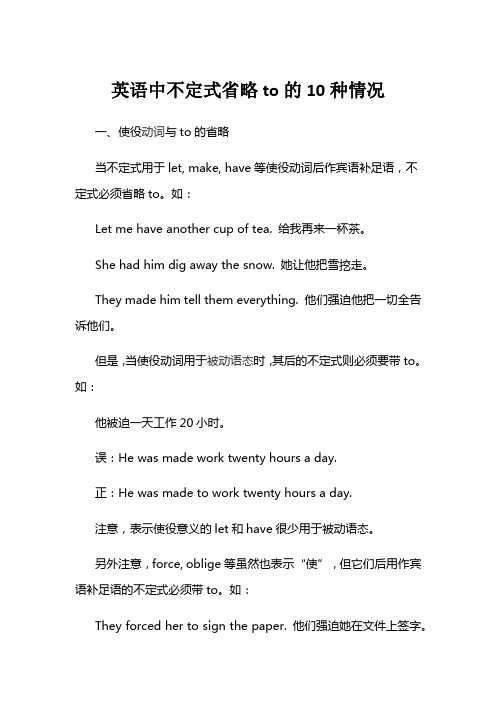
英语中不定式省略to的10种情况一、使役动词与to的省略当不定式用于let, make, have等使役动词后作宾语补足语,不定式必须省略to。
如:Let me have another cup of tea. 给我再来一杯茶。
She had him dig away the snow. 她让他把雪挖走。
They made him tell them everything. 他们强迫他把一切全告诉他们。
但是,当使役动词用于被动语态时,其后的不定式则必须要带to。
如:他被迫一天工作20小时。
误:He was made work twenty hours a day.正:He was made to work twenty hours a day.注意,表示使役意义的let和have很少用于被动语态。
另外注意,force, oblige等虽然也表示“使”,但它们后用作宾语补足语的不定式必须带to。
如:They forced her to sign the paper. 他们强迫她在文件上签字。
The law obliged parents to send their children to school. 法律要求父母送子女上学。
二、感觉动词与to的省略当不定式用于表示感觉的动词feel, hear, notice, observe, see, watch, look at, listen to等作宾语补足语时,不定式必须省略to。
如:We all felt the house shake. 我们都感觉这房子在震动。
I heard him go down the stairs. 我听见他下楼了。
Did you notice her leave the house? 她离开屋子你注意到了吗?I watched her get into the car. 我看着她上了车。
但是,当feel后用作宾语补足语的不定式为to be时,则不能省略to。
省略to的动词不定式

"大家都知道在动词不定式to do中,“to”是不定式的标志,有了这个to,后面所跟的动词该用原形。
但是to也有可以省略的时候,这个时候虽然没有了to,后面所跟的动词依然用原形。
今天的每日一课就给大家总结一些省略to的动词不定式。
1、情态动词(除ought 外)后的to已省略。
例:You must go to the hospital first. 你必须先去医院。
I can swim well. 我能游得很好。
2、使役动词let, have, make后,感官动词see, watch, look at, notice , observe, hear, listen to, smell, feel, find 等词后的to省略。
例:He made the baby crying all night long. 他让那个婴儿哭了一整夜。
Let it be. 就这样吧。
when I passed by, I saw the girl picking the flowers. 我经过的时候,看见那个女孩在摘花。
注意:在这些词的用法中,用于被动语态时不能省去to。
例:I saw him dance. 我看见他跳舞。
=He was seen to dance.The boss made them work the whole night. 老板让他们整夜干活。
=They were made to work the whole night.3、would rather/had better 后的to省略。
例:I would rather go to Japan than the USA.我宁愿去日本也不想去美国。
You had better take a hat with you.你最好带上一顶帽子。
4、why…/why not…句型中not后to省略。
例:why not come to my home for a dinner tonight?今晚何不来我家吃顿饭。
归纳省略to的动词不定式用法
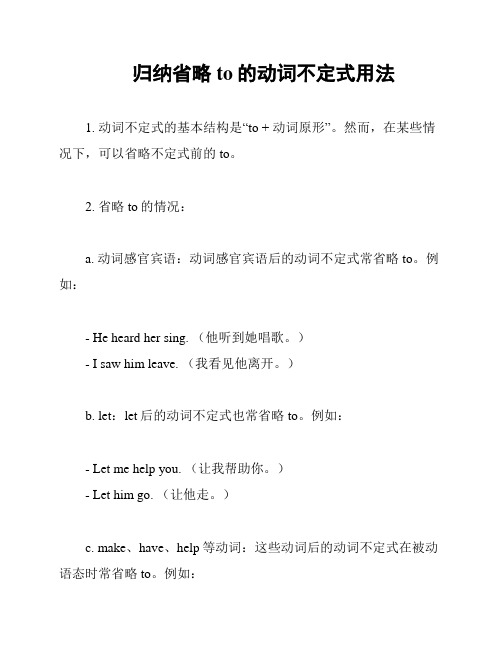
归纳省略to的动词不定式用法1. 动词不定式的基本结构是“to + 动词原形”。
然而,在某些情况下,可以省略不定式前的to。
2. 省略to的情况:a. 动词感官宾语:动词感官宾语后的动词不定式常省略to。
例如:- He heard her sing. (他听到她唱歌。
)- I saw him leave. (我看见他离开。
)b. let:let后的动词不定式也常省略to。
例如:- Let me help you. (让我帮助你。
)- Let him go. (让他走。
)c. make、have、help等动词:这些动词后的动词不定式在被动语态时常省略to。
例如:- She made me clean the room. (她让我打扫房间。
)- I had him fix the car. (我让他修理汽车。
)- He helped her find a job. (他帮她找到了工作。
)d. 情态动词:情态动词后的动词不定式常省略to。
例如:- You should study hard. (你应该努力研究。
)- He can't swim. (他不会游泳。
)3. 注意事项:- 当动词不定式作为名词、形容词或副词的补语时,不省略to。
例如:- My dream is to travel around the world. (我的梦想是周游世界。
)- She is happy to see you. (她高兴地看到了你。
)- He came to help us. (他来了帮助我们。
)- 不定式前如果有形容词或副词修饰,to不能省略。
例如:- She is too tired to dance. (她太累了,无法跳舞。
)- I was too scared to speak. (我害怕得说不出话。
)以上是关于省略to的动词不定式用法的归纳总结。
希望对您有所帮助。
动词不定式省略to的9种情况
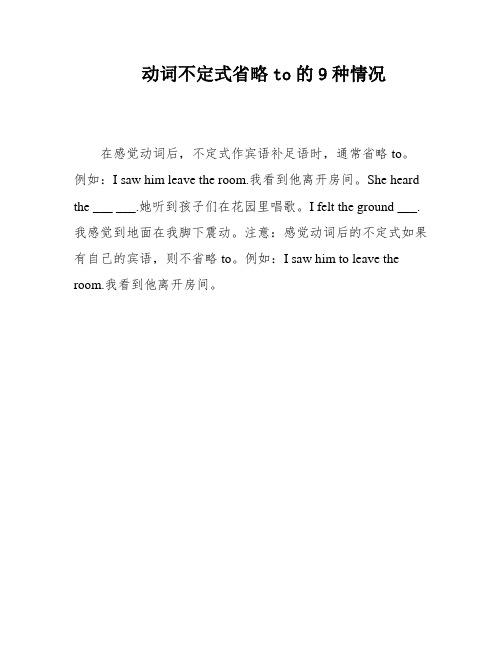
动词不定式省略to的9种情况在感觉动词后,不定式作宾语补足语时,通常省略to。
例如:I saw him leave the room.我看到他离开房间。
She heard the ___ ___.她听到孩子们在花园里唱歌。
I felt the ground ___.我感觉到地面在我脚下震动。
注意:感觉动词后的不定式如果有自己的宾语,则不省略to。
例如:I saw him to leave the room.我看到他离开房间。
注意:1.当help之后接一个较长的名词词组作宾语或当其中的不定式所表示的动作主语不直接参加时,不定式通常带to。
例如:Help the little boys at the back of the hall to carry the chairs out.请帮大厅后面那些小男孩把椅子搬出去。
These tablets will help you to sleep.这些药片将对你的睡眠有帮助。
2.在当help用于被动语态时,不定式前的to不能省略。
例如:Help is needed to clean up the mess.需要帮助清理这个混乱。
___ ___.Fourth。
n of "to" after "why (not)。
"___ infinitive after "why (not)。
" cannot be followed by "to"。
For example。
"Why go with him?" and "Why not ask the teacher?" In the sentence "Why not try to expand your story into a novel?"。
it should be "Why not try expanding your story into a novel?"Fifth。
不定式省略to的九种情况
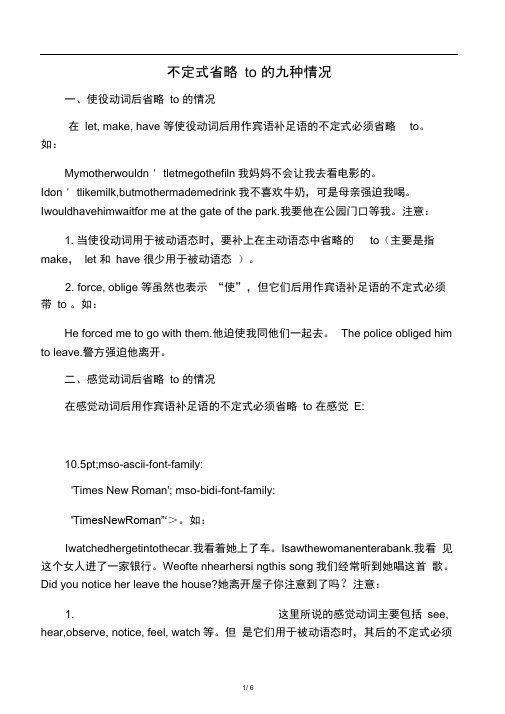
不定式省略to 的九种情况一、使役动词后省略to 的情况在let, make, have 等使役动词后用作宾语补足语的不定式必须省略to。
如:Mymotherwouldn ' tletmegothefiln我妈妈不会让我去看电影的。
Idon ' tlikemilk,butmothermademedrink我不喜欢牛奶,可是母亲强迫我喝。
Iwouldhavehimwaitfor me at the gate of the park.我要他在公园门口等我。
注意:1. 当使役动词用于被动语态时,要补上在主动语态中省略的to(主要是指make,let 和have 很少用于被动语态)。
2. force, oblige 等虽然也表示“使”,但它们后用作宾语补足语的不定式必须带to 。
如:He forced me to go with them.他迫使我同他们一起去。
The police obliged him to leave.警方强迫他离开。
二、感觉动词后省略to 的情况在感觉动词后用作宾语补足语的不定式必须省略to 在感觉E:10.5pt;mso-ascii-font-family:'Times New Roman'; mso-bidi-font-family:'TimesNewRoman”‘>。
如:Iwatchedhergetintothecar.我看着她上了车。
Isawthewomanenterabank.我看见这个女人进了一家银行。
Weofte nhearhersi ngthis song我们经常听到她唱这首歌。
Did you notice her leave the house?她离开屋子你注意到了吗?注意:1. 这里所说的感觉动词主要包括see, hear,observe, notice, feel, watch等。
但是它们用于被动语态时,其后的不定式必须带to。
【推荐下载】不定式省略to的10种的情况
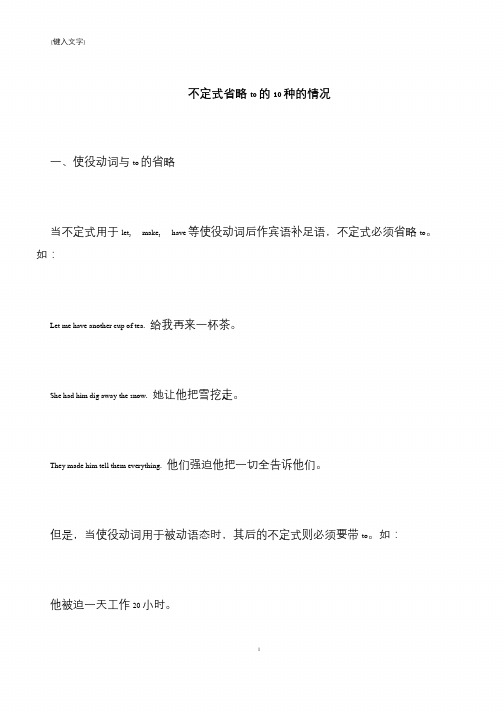
不定式省略to的10种的情况
一、使役动词与to的省略
当不定式用于let,make,have等使役动词后作宾语补足语,不定式必须省略to。
如:
Let me have another cup of tea.给我再来一杯茶。
She had him dig away the snow.她让他把雪挖走。
以省略to。如:
9
[键入文字]
What you first do is(to) mix the egg with flour.你先得把鸡蛋和面粉和好。
AllIdidwas(to)touchthewindow,anditbroke.我只不过碰了一下窗户,玻璃就碎
了。
九、并列不定式与to的省略
当两个或多个作用相同的不定式并列时,通常只需在第一个不定式前用to,其余
Whynotwaittillthewintersalestobuyanewcoat?为什么不等到冬季大贱卖时再买
一件新外衣呢?
4
[键入文字]
Can you help (to) carry thistable upstairs?你能帮忙把桌子搬到楼上去吗?
Ihavelostmywatch.Willyouhelpme(to)lookforit?我把表丢了,你能不能帮我找
Ive never known her (to) be late before.我以前从不知道她迟到过。
二是用于know+宾语+todo:当know为现在式时,其中的to不能省略;当know
为过去式或完成式时,其中的to可以省略也可以保留。如:
Theyknow him to have been a spy.他们知道他过去当过间谍。
不定式省略to的九种情况
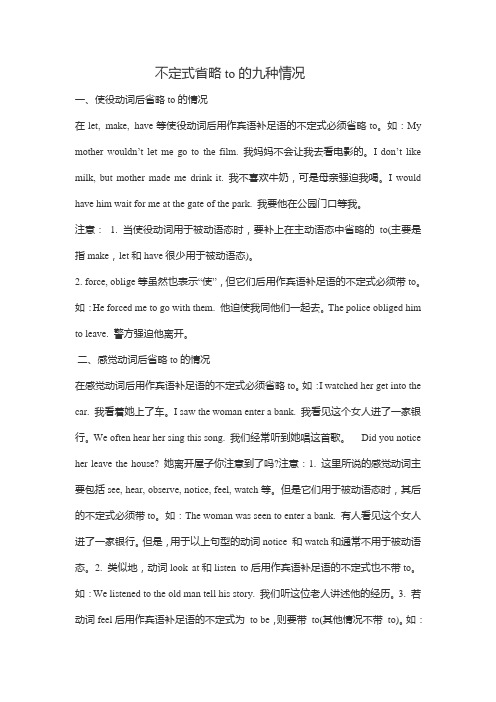
不定式省略to的九种情况一、使役动词后省略to的情况在let, make, have等使役动词后用作宾语补足语的不定式必须省略to。
如:My mother wouldn’t let me go to the film. 我妈妈不会让我去看电影的。
I don’t like milk, but mother made me drink it. 我不喜欢牛奶,可是母亲强迫我喝。
I would have him wait for me at the gate of the park. 我要他在公园门口等我。
注意: 1. 当使役动词用于被动语态时,要补上在主动语态中省略的to(主要是指make,let和have很少用于被动语态)。
2. force, oblige等虽然也表示“使”,但它们后用作宾语补足语的不定式必须带to。
如:He forced me to go with them. 他迫使我同他们一起去。
The police obliged him to leave. 警方强迫他离开。
二、感觉动词后省略to的情况在感觉动词后用作宾语补足语的不定式必须省略to。
如:I watched her get into the car. 我看着她上了车。
I saw the woman enter a bank. 我看见这个女人进了一家银行。
We often hear her sing this song. 我们经常听到她唱这首歌。
Did you notice her leave the house? 她离开屋子你注意到了吗?注意:1. 这里所说的感觉动词主要包括see, hear, observe, notice, feel, watch等。
但是它们用于被动语态时,其后的不定式必须带to。
如:The woman was seen to enter a bank. 有人看见这个女人进了一家银行。
但是,用于以上句型的动词notice 和watch和通常不用于被动语态。
不定式省略to的10种情况

不定式省略to的几种情况一、使役动词与to的省略当不定式用于let, make, have等使役动词后作宾语补足语,不定式必须省略to。
如:Let me have another cup of tea.给我再来一杯茶。
She had him dig away the snow.她让他把雪挖走。
They made him tell them everything.他们强迫他把一切全告诉他们。
但是,当使役动词用于被动语态时,其后的不定式则必须要带to。
如:他被迫一天工作20小时。
误:He was made work twenty hours a day.正:He was made to work twenty hours a day.注意,表示使役意义的let和have很少用于被动语态。
另外注意,force, oblige等虽然也表示“使”,但它们后用作宾语补足语的不定式必须带to。
如:They forced her to sign the paper.他们强迫她在文件上签字。
The law obliged parents to send their children to school.法律要求父母送子女上学。
二、感觉动词与to的省略当不定式用于表示感觉的动词feel, hear, notice, observe, see, watch, look at, listen to等作宾语补足语时,不定式必须省略to。
如:We all felt the house shake.我们都感觉这房子在震动。
I heard him go down the stairs.我听见他下楼了。
Did you notice her leave the house?她离开屋子你注意到了吗?I watched her get into the car.我看着她上了车。
但是,当feel后用作宾语补足语的不定式为to be时,则不能省略to。
不定式省略to的九种情况
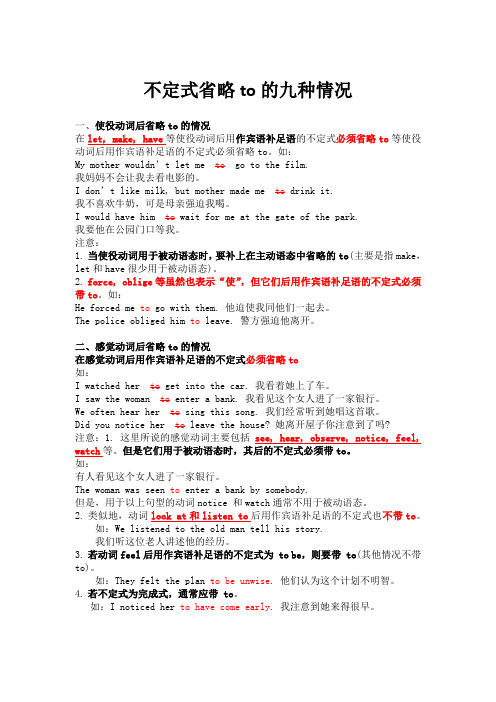
不定式省略to的九种情况一、使役动词后省略to的情况在let, make, have等使役动词后用作宾语补足语的不定式必须省略to等使役动词后用作宾语补足语的不定式必须省略to。
如:My mother wouldn’t let me to go to the film.我妈妈不会让我去看电影的。
I don’t like milk, but mother made me to drink it.我不喜欢牛奶,可是母亲强迫我喝。
I would have him to wait for me at the gate of the park.我要他在公园门口等我。
注意:1.当使役动词用于被动语态时,要补上在主动语态中省略的to(主要是指make,let和have很少用于被动语态)。
2.force, oblige等虽然也表示“使”,但它们后用作宾语补足语的不定式必须带to。
如:He forced me to go with them. 他迫使我同他们一起去。
The police obliged him to leave. 警方强迫他离开。
二、感觉动词后省略to的情况在感觉动词后用作宾语补足语的不定式必须省略to如:I watched her to get into the car. 我看着她上了车。
I saw the woman to enter a bank. 我看见这个女人进了一家银行。
We often hear her to sing this song. 我们经常听到她唱这首歌。
Did you notice her to leave the house? 她离开屋子你注意到了吗?注意:1. 这里所说的感觉动词主要包括see, hear, observe, notice, feel, watch等。
但是它们用于被动语态时,其后的不定式必须带to。
如:有人看见这个女人进了一家银行。
The woman was seen to enter a bank by somebody.但是,用于以上句型的动词notice 和watch通常不用于被动语态。
英语中不定式省略to的九种情况
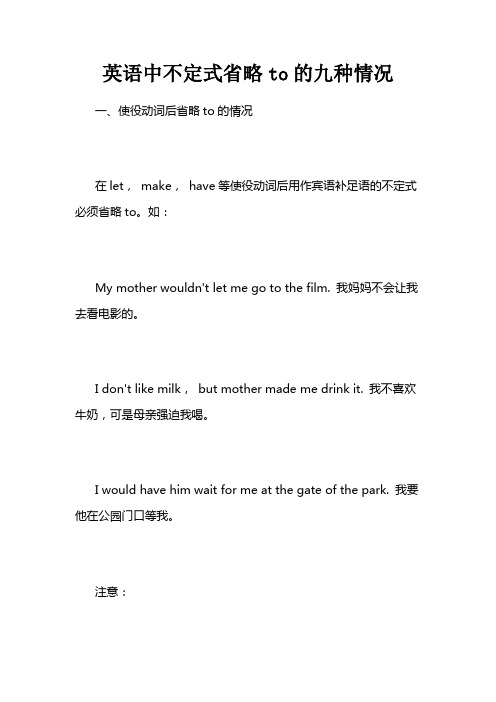
英语中不定式省略to的九种情况一、使役动词后省略to的情况在let,make,have等使役动词后用作宾语补足语的不定式必须省略to。
如:My mother wouldn't let me go to the film. 我妈妈不会让我去看电影的。
I don't like milk,but mother made me drink it. 我不喜欢牛奶,可是母亲强迫我喝。
I would have him wait for me at the gate of the park. 我要他在公园门口等我。
注意:1. 当使役动词用于被动语态时,要补上在主动语态中省略的to(主要是指make,let和have很少用于被动语态)。
2. force,oblige等虽然也表示“使”,但它们后用作宾语补足语的不定式必须带to。
如:He forced me to go with them. 他迫使我同他们一起去。
The police obliged him to leave. 警方强迫他离开。
二、感觉动词后省略to的情况在感觉动词后用作宾语补足语的不定式必须省略to。
如:I watched her get into the car. 我看着她上了车。
I saw the woman enter a bank. 我看见这个女人进了一家银行。
We often hear her sing this song. 我们经常听到她唱这首歌。
Did you notice her leave the house?她离开屋子你注意到了吗?注意:1. 这里所说的感觉动词主要包括see,hear,observe,notice,feel,watch等。
但是它们用于被动语态时,其后的不定式必须带to。
如:The woman was seen to enter a bank. 有人看见这个女人进了一家银行。
但是,用于以上句型的动词notice 和watch通常不用于被动语态。
- 1、下载文档前请自行甄别文档内容的完整性,平台不提供额外的编辑、内容补充、找答案等附加服务。
- 2、"仅部分预览"的文档,不可在线预览部分如存在完整性等问题,可反馈申请退款(可完整预览的文档不适用该条件!)。
- 3、如文档侵犯您的权益,请联系客服反馈,我们会尽快为您处理(人工客服工作时间:9:00-18:30)。
不定式省略to的10种情况2009-12-30 11:32:34 来源:编辑:点击:次年终奖:你的年终奖到手了吗?冷暴力口语,你伤父母心了吗?一、使役动词与to的省略当不定式用于let, make, have等使役动词后作宾语补足语,不定式必须省略to。
如:Let me have another cup of tea. 给我再来一杯茶。
She had him dig away the snow. 她让他把雪挖走。
They made him tell them everything. 他们强迫他把一切全告诉他们。
但是,当使役动词用于被动语态时,其后的不定式则必须要带to。
如:他被迫一天工作20小时。
误:He was made work twenty hours a day.正:He was made to work twenty hours a day.注意,表示使役意义的let和have很少用于被动语态。
另外注意,force, oblige等虽然也表示“使”,但它们后用作宾语补足语的不定式必须带to。
如:They forced her to sign the paper. 他们强迫她在文件上签字。
The law obliged parents to send their children to school. 法律要求父母送子女上学。
二、感觉动词与to的省略当不定式用于表示感觉的动词feel, hear, notice, observe, see, watch, look at, listen to等作宾语补足语时,不定式必须省略to。
如:We all felt the house shake. 我们都感觉这房子在震动。
I heard him go down the stairs. 我听见他下楼了。
Did you notice her leave the house? 她离开屋子你注意到了吗?I watched her get into the car. 我看着她上了车。
但是,当feel后用作宾语补足语的不定式为to be时,则不能省略to。
如:They all felt the plan to be unwise. 他们都认为这个计划不明智。
注意,当这些动词变为被动语态时,不定式前的to不能省略。
如:They were heard to break a glass in the next door. 听见他们在隔壁打破了一个玻璃杯子。
另外,若用作宾语补足语的不定式为完成式,则通常应带to。
如:I noticed her to have come early. 我注意到她来得很早。
三、why (not) 与to的省略在why (not)…?之后的不定式不能带to。
如:Why argue with him? He’ll never change his mind. 为什么要跟他争论? 他永远不会改变自己的看法。
Why not try going by boat for a change? 为什么不试着坐船去,这样也可以换换花样?Why not wait till the winter sales to buy a new coat? 为什么不等到冬季大贱卖时再买一件新外衣呢?四、介词except / but与to的省略当不定式用作介词except或except的宾语时,该不定式有时带to,有时不带to,情形比较复杂,大致原则是:其前有do,不定式不带to;其前没有do,不定式通常带to。
如:He likes nothing except to watch TV. 除了看电视外,他什么都不喜欢。
It had no effect except to make him angry. 除惹他生气外,没产生任何效果。
There’s little we can do except wait. 除了等待我们没有什么办法。
I could do nothing except agree. 我除了同意,没有别的办法。
五、help与to的省略当动词help后跟一个不定式用作宾语或宾语补足语时,不定式可以不带to,也可以不带to。
如:Can you help (to) carry this table upstairs? 你能帮忙把桌子搬到楼上去吗?I have lost my watch. Will you help me (to) look for it? 我把表丢了,你能不能帮我找一下?但是,当help用于被动语态时,其后不定式必须带to。
如:Millie was helped to overcome her fear of flying. 米利被帮助克服了她的飞行恐惧。
另外,当不定式为否定式时,其中的to通常不宜省略。
如:How can I help my children not to worry about their exams? 我怎样才能帮助我的孩子们不为他们的考试着急呢?六、know 与to 的省略不定式用于动词know 之后作宾语补足语主要见于以下两类句型:一是用于“know+宾语+to be”:当know 为现在式时,其中的to 不能省略;当know 为过去式或完成式时,其中的to可以省略也可以保留。
如:I know him to be a fool.=I know (that) he is a fool. 我知道他是个傻瓜。
I’ve never known her (to) be late before. 我以前从不知道她迟到过。
二是用于“know+宾语+to do”:当know 为现在式时,其中的to 不能省略;当know 为过去式或完成式时,其中的to 可以省略也可以保留。
如:They know him to have been a spy. 他们知道他过去当过间谍。
I never knew him (to) do such a thing. •我从未见过他干那种事。
I’ve never known it (to) snow in July before. 我以前从未听说过七月份会下雪。
注意,在被动语态中,不定式必须带to。
如:He has never been known to tell a lie. •从未有人听说过他说谎。
另外,当其中的不定式为完成式时,to也不可省略。
如:They knew the man to have been a thief. 他们发现此人曾是个小偷。
I have never known her to have failed. 我从来没发现她失败过。
七、bid 与to 的省略当bid表示“吩咐”时,用于其后作宾语补足语的不定式可以带to也可以不带to。
如:She bade me (to) come in. 她叫我进来。
He bade me (to) do the work. 他吩咐我去做那项工作。
但是,在当bid为被动语态时,其后的不定式必须带to。
如:I was bidden to do the work. 我被嘱咐去做那项工作。
八、不定式作表语与to 的省略当不定式用作表语时,其中的to 原则上是不能省略的。
如:His aim is to do two years’work in one. 他的目标是一年干两年的工作。
This wall is to keep people out of the garden. 这堵墙为的是不让人到花园里来。
但有一种例外,那就是当主语部分有动词do的某种形式时,用作表语的不定式可以省略to。
如:What you first do is (to) mix the egg with flour. 你先得把鸡蛋和面粉和好。
All I did was (to) touch the window, and it broke. 我只不过碰了一下窗户,玻璃就碎了。
九、并列不定式与to的省略当两个或多个作用相同的不定式并列时,通常只需在第一个不定式前用to,其余不定式前的to 可以省略。
如:I’d like to lie down and (to) go to sleep. 我想躺下睡觉了。
Will you go to see the film or (to) dance? 你要去看电影还是要去跳舞?I’ll go to see him myself and (to) ask him about it. 我将亲自去看望他并问一问那件事情。
但是,如果两者有对比关系,则后面不定式前的to不可省略。
如:To try and fail is better than not to try at all. 尝试而失败总比不尝试好。
十、固定搭配与to的省略1. let类固定搭配:let fall (无意中说出),let fly(发射、攻击),let go (放开),let slip (放走),live and let live (自己活也让别人活)等。
如:She let slip a chance to work abroad. 她错过了出国工作的机会。
The dog’s got a stick between his teeth and he won’t let go. 那狗叼着一根棍儿不松口。
He aimed carefully and then let fly. 他仔细瞄准之后便开了枪。
I guessed what was happening from a few words she let fall. 我从她说的几句话中猜出发生什么事了。
2. make类搭配:make believe (假装),make do (凑合着用)等。
如:The boys made believe (that) they were astronauts. 男孩子们假扮成航天员。
We were in a hurry so we had to make do with a quick snack. 我们时间很紧,只好胡乱吃了顿小吃。
不定式省略to的10种情况一、使役动词与to的省略当不定式用于let, make, have等使役动词后作宾语补足语,不定式必须省略to。
如:Let me have another cup of tea. 给我再来一杯茶。
She had him dig away the snow. 她让他把雪挖走。
They made him tell them everything. 他们强迫他把一切全告诉他们。
但是,当使役动词用于被动语态时,其后的不定式则必须要带to。
如:他被迫一天工作20小时。
误:He was made work twenty hours a day.正:He was made to work twenty hours a day.注意,表示使役意义的let和have很少用于被动语态。
